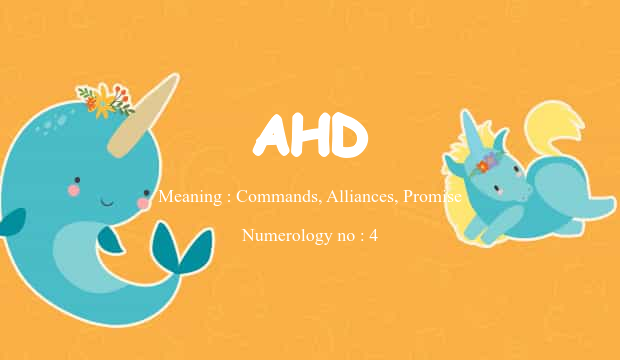Ahd Meaning: Unveiling the Significance Behind the Term

Curious about the meaning of “Ahd”? You’re not alone.
This term is gaining popularity, but many still wonder what it stands for. “Ahd” might seem simple, but its meaning is rich and varied. It is a term used in different contexts and cultures, each adding a unique layer. Whether you’re exploring its linguistic roots or its cultural significance, understanding “Ahd” can open up new perspectives.
Dive into its definitions and discover why this word is becoming so significant. From its origins to its modern usage, let’s explore the full meaning of “Ahd” together.

Credit: www.jurovichsurveying.com.au
Historical Context
Understanding the historical context of the term “Ahd” provides deeper insights into its significance. The word has rich roots and a fascinating journey through different eras and cultures.
Ancient Uses
In ancient times, “Ahd” was used in a variety of contexts. It often referred to agreements or covenants between tribes or individuals. These agreements were crucial for maintaining peace and order. They were often solemn and binding.
In some cultures, “Ahd” symbolized loyalty and trust. People valued these agreements highly. They were seen as unbreakable promises. Breaking an “Ahd” was considered dishonorable.
Evolution Over Time
Over the centuries, the meaning of “Ahd” has evolved. It adapted to the changing social and cultural landscapes. In medieval times, “Ahd” began to represent more formalized contracts. These were often written and legally binding.
In modern times, the term has broadened further. “Ahd” can now refer to personal commitments or even business deals. Its core essence of trust and agreement remains intact.
| Era | Meaning |
|---|---|
| Ancient Times | Agreements between tribes or individuals |
| Medieval Times | Formalized contracts |
| Modern Times | Personal commitments or business deals |
As we see, “Ahd” has a dynamic history. Its evolution reflects the changing nature of human interactions. Despite these changes, its foundation of trust and promise endures.
Linguistic Roots
The term “Ahd” holds deep significance in many cultures. Understanding its linguistic roots helps us grasp its broader meanings. In this section, we explore the origins and influences of the term “Ahd”.
Etymology
The word “Ahd” originates from Arabic. It translates to “covenant” or “promise”. This root word carries connotations of commitment and trust. It is often used in religious and cultural contexts.
| Language | Meaning |
|---|---|
| Arabic | Covenant, Promise |
| Hebrew | Agreement, Pact |
| Persian | Contract, Vow |
Language Influence
The concept of “Ahd” has influenced many languages. In Hebrew, a related word is “Berith”, meaning agreement. Persian also uses a similar term, emphasizing the importance of vows and contracts. This cross-cultural usage highlights its universal appeal.
Here are some ways “Ahd” influences different languages:
- Arabic: Used in religious texts and daily promises.
- Hebrew: Found in ancient scriptures and modern agreements.
- Persian: Common in legal and personal vows.
Each language adapts the term to fit its cultural context. This adaptation shows the term’s versatility and significance.
Religious Significance
The term Ahd has deep religious significance across various faiths. It often symbolizes a covenant or a divine promise. Understanding its meaning enriches the spiritual life of believers.
In Islamic Tradition
In Islam, Ahd refers to a solemn pledge or promise. It is often used in the context of the covenant between Allah and humanity. This covenant is seen as an agreement to follow the guidance of Allah.
Muslims believe that adhering to this covenant brings them closer to Allah. The Quran mentions Ahd in several verses, emphasizing its importance. For instance:
"Fulfill the covenant of Allah when you have taken a covenant." (Quran 16:91)
Breaking this covenant is considered a serious sin in Islam. It is believed to lead to spiritual and social consequences.
Other Religious Interpretations
In Judaism, Ahd is similar to the Hebrew word “Brit”. It signifies a covenant between God and the people of Israel. This covenant is seen as a binding agreement to follow God’s commandments.
Christians also recognize the concept of a divine covenant. In Christianity, it often refers to the New Covenant established by Jesus Christ. This covenant is seen as a promise of salvation and eternal life.
These different interpretations highlight the universal importance of Ahd in religious practices. Despite the variations, the core idea remains a commitment to a higher power.
Understanding these religious perspectives can provide a broader view of the term Ahd. It shows how a simple word can carry profound spiritual meaning.

Credit: echomaster.com
Philosophical Perspectives
Philosophical perspectives on the meaning of “Ahd” delve deep into human values. They explore the significance of promises and their moral weight. These views help us understand the profound impact of keeping one’s word. Let’s explore this through different lenses.
Concept Of Promise
The concept of a promise is central to human interactions. A promise builds trust and fosters relationships. It is a commitment to do something in the future. Breaking a promise can lead to distrust and disappointment. Thus, a promise holds significant value in our lives.
Moral Implications
Promises carry moral implications that shape our character. Keeping a promise shows integrity and reliability. It reflects one’s sense of duty and honor. Failing to keep a promise can harm one’s reputation. Hence, honoring commitments is vital for moral standing.
Modern Day Usage
The term “Ahd” has evolved over time. Its modern day usage spans various contexts. Let’s explore how it is used today.
In Legal Contexts
In legal settings, “Ahd” often refers to a formal agreement or contract. Lawyers and judges use it to denote a binding promise. These agreements can be between individuals, companies, or governments.
Here is a table showing different types of legal agreements:
| Type | Description |
|---|---|
| Contract | A written or spoken agreement enforceable by law. |
| Treaty | An agreement between countries. |
| Pledge | A solemn promise or undertaking. |
Such agreements ensure clarity and responsibility. They are crucial in maintaining order and fairness.
In Everyday Language
In everyday language, “Ahd” is often used to refer to any kind of promise. It signifies commitment and trust.
Here are some common phrases using the term:
- “I give you my ahd.”
- “He broke his ahd.”
- “She kept her ahd.”
These phrases highlight the importance of keeping promises. They show how trust is built in daily interactions.

Credit: www.momjunction.com
Ahd In Literature
The term “Ahd” has a rich history in literature. It appears in classical texts and continues to influence contemporary works. Let’s explore its impact on literature through various eras.
Classical References
In classical literature, “Ahd” often symbolizes trust and commitment. Ancient poets and writers used it to convey solemn promises and binding agreements. This term can be found in historical documents and ancient manuscripts. It highlights the importance of honor and integrity in past cultures.
Contemporary Works
Modern authors also incorporate “Ahd” in their stories. It appears in novels, plays, and poems. These works use “Ahd” to explore themes of loyalty and faith. Contemporary writers often adapt the classical meaning to fit modern contexts. They use it to create deep and relatable characters. This keeps the essence of “Ahd” alive in today’s literature.
Global Interpretations
The term “Ahd” carries different meanings across the world. Its interpretations can vary significantly based on cultural and regional contexts. Understanding these variations helps in appreciating the diverse significance of “Ahd” globally.
Cross-cultural Views
Different cultures perceive “Ahd” in unique ways. In some Middle Eastern cultures, “Ahd” signifies a promise or a covenant. It holds deep spiritual and social importance. People value it as a binding agreement, often linked to trust and honor.
In South Asian cultures, “Ahd” might be seen as a pledge or a commitment. It reflects a person’s dedication to fulfilling their word. This interpretation emphasizes the moral responsibility associated with making promises.
Regional Variations
In the Arab world, “Ahd” often relates to agreements between tribes or communities. These agreements can be social or political. They form the basis of mutual respect and cooperation.
In contrast, in Western contexts, “Ahd” could be understood as a lesser-known term. It might appear in historical or scholarly texts. Here, it might relate more to legal or formal agreements.
In some African regions, “Ahd” might be associated with traditional rituals. It symbolizes the bond between individuals and their communities. This interpretation underscores the social fabric and interconnectedness of society.
Frequently Asked Questions
What Does Ahd Mean?
Ahd is an Arabic term meaning “promise” or “covenant. ” It signifies commitment and trust.
How Is Ahd Used In Sentences?
Ahd is used to express a strong commitment or promise, often in formal or religious contexts.
What Is The Origin Of Ahd?
The term Ahd originates from Arabic language and is commonly used in Islamic culture.
Can Ahd Be Used In Daily Conversation?
Yes, Ahd can be used in everyday conversations to signify a promise or commitment.
Conclusion
Understanding the meaning of “Ahd” can enhance your vocabulary. It’s a unique term with rich cultural significance. Knowing its context helps in deeper conversations. Use this knowledge to connect with others. Explore more terms to expand your language skills. Stay curious and keep learning.
Thank you for reading!
